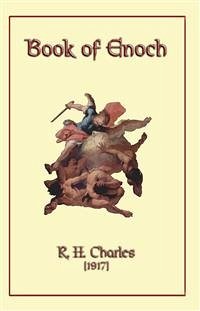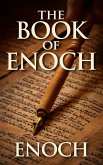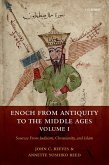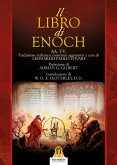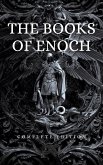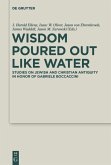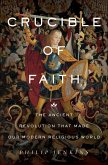ABOUT THE BOOK OF ENOCH
The Book of Enoch is an ancient Hebrew apocalyptic and pseudepigraphal text attributed to Enoch, the father of Methuselah and the great-grandfather of Noah. This is a book of apocalyptic visions with great significance in Judaism and Christianity.
Introduction:
The Book of Enoch, an intriguing ancient Hebrew text, holds a unique place in the religious heritage of both Christians and Jews. Attributed to the patriarch Enoch, this apocalyptic work offers profound insights into the spiritual realm, the fallen angels, and the path to judgment day. In this comprehensive guide, we'll delve into the mysteries of Enoch, uncover its historical roots, and explore its enduring relevance for believers today.
The Origins of Enoch:
The Book of Enoch is a pseudepigraphal work, meaning it's attributed to Enoch but not considered canonical by mainstream religious traditions. This ancient text is believed to have originated during the Second Temple period and is part of the Apocrypha and Pseudepigrapha, offering a unique perspective on Enoch's teachings.
Enoch and Methuselah:
Enoch, the protagonist of this book, was the father of Methuselah and the great-grandfather of Noah. His lineage ties the text closely to the biblical narrative and gives it historical significance. The Book of Enoch provides a glimpse into the pre-Flood era and the spiritual wisdom passed down through generations.
The Fallen Angels and the Watchers:
A central theme in the Book of Enoch revolves around the fallen angels, often referred to as "Watchers." These celestial beings descended to Earth, sharing forbidden knowledge with humanity. Enoch documents their deeds, consequences, and God's response, shedding light on the battle between good and evil.
Apocalyptic Visions and Judgment Day:
Enoch's visionary experiences form a pivotal part of the text, unveiling apocalyptic prophecies and offering insights into judgment day. These visions provide a unique perspective on eschatology, the study of the end times, and the ultimate fate of humanity.
The Work of R.H. Charles:
Renowned scholar R.H. Charles made the Book of Enoch more accessible by translating the Ethiopic version in the early 20th century. His contributions, including commentary, have been invaluable in understanding Enoch's teachings and their significance in religious discourse. Numerous online resources offer the text for download in PDF format, but here is provided a paperback format for maximum reading experience.
Enoch in Contemporary era
Despite its ancient origins, the Book of Enoch continues to captivate religious scholars. Its teachings and themes inspire discussions about spirituality, morality, and the mysteries of the cosmos.
The Book of Enoch is an ancient Hebrew apocalyptic and pseudepigraphal text attributed to Enoch, the father of Methuselah and the great-grandfather of Noah. This is a book of apocalyptic visions with great significance in Judaism and Christianity.
Introduction:
The Book of Enoch, an intriguing ancient Hebrew text, holds a unique place in the religious heritage of both Christians and Jews. Attributed to the patriarch Enoch, this apocalyptic work offers profound insights into the spiritual realm, the fallen angels, and the path to judgment day. In this comprehensive guide, we'll delve into the mysteries of Enoch, uncover its historical roots, and explore its enduring relevance for believers today.
The Origins of Enoch:
The Book of Enoch is a pseudepigraphal work, meaning it's attributed to Enoch but not considered canonical by mainstream religious traditions. This ancient text is believed to have originated during the Second Temple period and is part of the Apocrypha and Pseudepigrapha, offering a unique perspective on Enoch's teachings.
Enoch and Methuselah:
Enoch, the protagonist of this book, was the father of Methuselah and the great-grandfather of Noah. His lineage ties the text closely to the biblical narrative and gives it historical significance. The Book of Enoch provides a glimpse into the pre-Flood era and the spiritual wisdom passed down through generations.
The Fallen Angels and the Watchers:
A central theme in the Book of Enoch revolves around the fallen angels, often referred to as "Watchers." These celestial beings descended to Earth, sharing forbidden knowledge with humanity. Enoch documents their deeds, consequences, and God's response, shedding light on the battle between good and evil.
Apocalyptic Visions and Judgment Day:
Enoch's visionary experiences form a pivotal part of the text, unveiling apocalyptic prophecies and offering insights into judgment day. These visions provide a unique perspective on eschatology, the study of the end times, and the ultimate fate of humanity.
The Work of R.H. Charles:
Renowned scholar R.H. Charles made the Book of Enoch more accessible by translating the Ethiopic version in the early 20th century. His contributions, including commentary, have been invaluable in understanding Enoch's teachings and their significance in religious discourse. Numerous online resources offer the text for download in PDF format, but here is provided a paperback format for maximum reading experience.
Enoch in Contemporary era
Despite its ancient origins, the Book of Enoch continues to captivate religious scholars. Its teachings and themes inspire discussions about spirituality, morality, and the mysteries of the cosmos.



